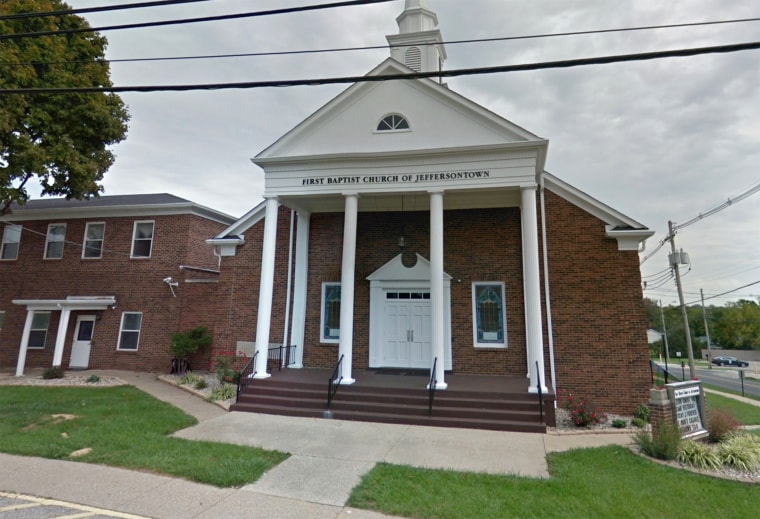Less than a week after a gunman tried unsuccessfully to enter its doors, a black church community in Kentucky is expressing solidarity with the victims of Saturday’s mass shooting at a Pittsburgh synagogue.
First Baptist Church of Jeffersontown avoided a tragedy last Wednesday after police revealed a man who allegedly killed two people at a nearby Kroger grocery store initially tried to force his way inside the church following a midday service.
Church administrators tell NBC News the incident has left the congregation distressed and dismayed.
“We didn't have the physical loss of a loved one, but a lot of our staff members are feeling what we call the aftershock - the ‘what if,’” said Billy Williams, referring to the 11 people who died at the Tree of Life synagogue over the weekend. “When one feels pain, we all feel pain. I think [our congregation] all feel the trauma of being confronted on [our] own front door.”
Sunday, Jeffersontown Police Chief Sam Rogers joined services to address both incidents.
“These two most recent examples of hate crimes were carried out by evil people,” Rogers said, according to NBC affiliate WAVE3.
Rogers’ team is helping investigate the events that led to 51-year-old Gregory Bush entering a Jeffersontown Kroger Wednesday afternoon and killing two African-Americans. The victims have since been identified as 69-year-old Maurice Stallard and 67-year-old Vickie Lee Jones.
The police chief made the church’s close encounter public Thursday evening after revealing that the alleged gunman had attempted to enter the First Baptist Church just 10 to 15 minutes before the incident.
“I fell on my knees right then and there,” said First Baptist Church staff member Travis Hines, describing the moment he realized he was an open door away from coming face to face with Bush.
According to Rogers, Bush had attempted to get in through several of the church’s doors but left after he discovered he couldn’t open them.
But there is at least one door he didn’t try to open and that’s the one that Hines said he was in charge of opening that day.
“I would have probably buzzed him in if he would have rang the buzzer,” Hines said.
There is potential evidence indicating that bias motivated both alleged gunmen in Pittsburgh and Jeffersontown.
According to the United States Attorney’s Office in the Western District of Kentucky, “civil rights violations such as hate crimes” are among the possible charges federal investigators are looking into for Bush.
“The shooter made a statement to a witness to the effect of ‘whites don’t kill whites.’” Rogers said, referring to the account of a man later identified by the Courier-Journal and NBC News as Ed Harrell who said Bush had uttered the racially-charged statement shortly after killing his second victim.
“Those are fact, they happened,” the police chief added.
Rogers, who had previously declined to comment on whether authorities had been investigating race as a motive for the crime, told WAVE3 News Sunday that he wanted to “call it what it was” and that the crime was “racism in action.”
The Pittsburgh Department of Public Safety tweeted immediately that Saturday’s synagogue shooting would be prosecuted as a hate crime. The shooter, 46-year-old Robert Bowers, allegedly posted several anti-Semitic messages online and reportedly said "All Jews must die" before opening fire.
But last week’s events are part of a glaring history of attacks against faith institutions, Williams said.
“I grew up in an area where hatred was initially displayed in churches,” referring to attacks against Alabama churches like the 1963 16th Street Baptist Church bombing.
Various First Baptist members tell NBC News that the Charleston, South Carolina shooting changed the way they thought about security.
Hines said the shooting, which claimed the lives of nine people at Emanuel African Methodist Episcopal Church, prompted officials to install a timed lock, add outdoor surveillance equipment and establish a police presence at the church.
Congregation member Kendall Daniel said she is “grateful” to see that no one was hurt on Wednesday.
“If those doors had been unlocked,” Daniel said, “…we could have potentially had a repeat of Charleston.”
Williams said that he can see how churches remain “soft targets” for attackers and is in talks with other staff members to increase security measures yet again.
In the meantime, the office administrator said it has been receiving messages from other parishes in places like Atlanta, Georgia and Milwaukee, Wisconsin seeking advice on how they too can protect their parishioners.
“Some things that we are hearing in public speak is causing our leaders to stand up and address what had happened,” Williams said.

